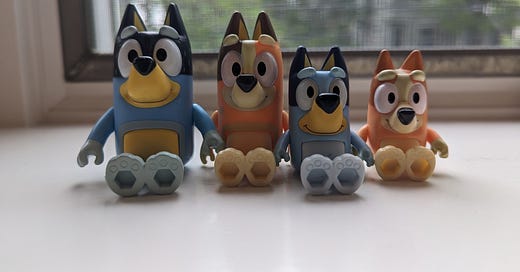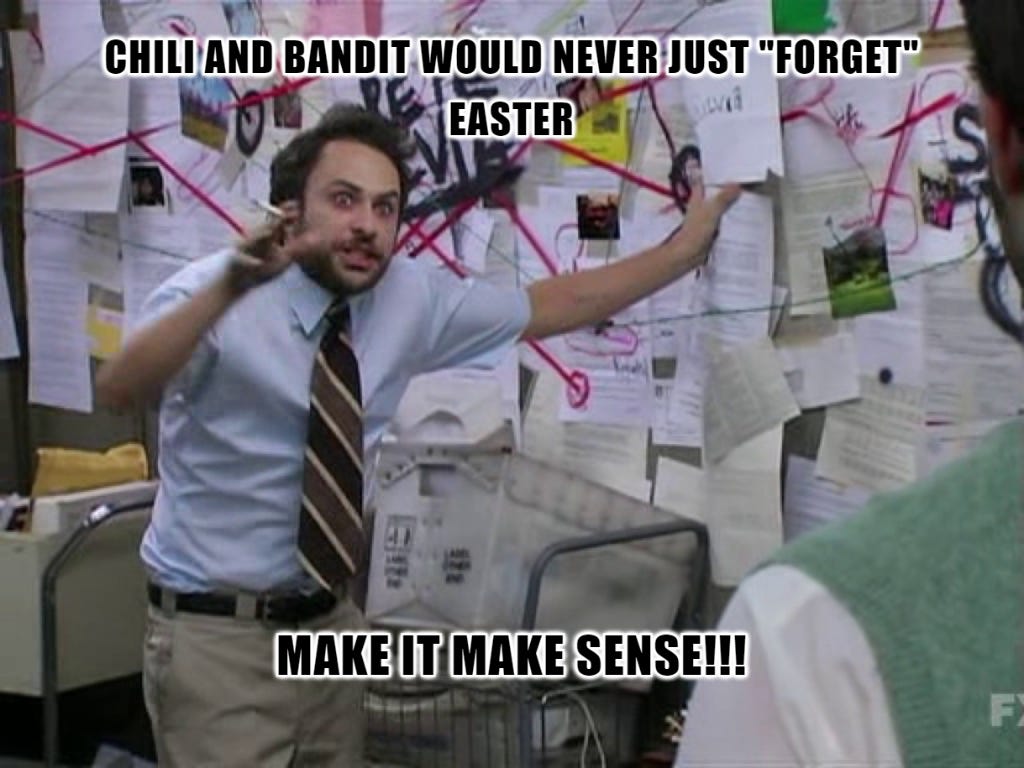The World is a Magical Place: Bluey and Positive Psychological Skills
Bluey is a better therapist than me and I'm OK with that
Note that this post has multiple references to plot points from the TV series Bluey. This is less a spoiler alert, and more an attempt to prepare you for how deep I can get into Bluey (which is very deep). You've been warned.
Like practically every parent of young children I know, I am obsessed with Bluey. The slice-of-life adventures of the Australian Heeler family, including seven-year old Bluey, younger sister Bingo, mom Chili, and dad Bandit, are a constant source of amusement and inspiration.
My preschooler seems to enjoy the show because it’s funny and it teaches him a variety of games he can make his parents play, such as “Keepy Uppy” (or as he calls it, “keepy uppy where the balloon not fall down”) and pretending that he is a gorilla kidnaping a toddler named Snowdrop1 like in “Zoo.” It’s also our bedtime ritual show, so it's a source of comfort and consistency for him at the end of the day.
I enjoy Bluey for the same reasons most adults enjoy the series. Yes, it’s legitimately hilarious. It’s surprisingly moving.2 It’s honest in equal measure about both the difficulties and joys of parenting, something that is becoming increasingly rare in our media landscape. The soundtrack slaps. It’s fun to argue with parent friends over long text chains about our favorite episodes or unsolved mysteries of the show. For example, this is basically my husband whenever we watch the “Easter” episode:
As a clinical psychologist and therapist, I’ve also been impressed with the way the show demonstrates many skills that I use in my own clinical practice.
From the way Chili struggles with staying in the present moment in “Relax” to how sometimes it can feel easier to stay grumpy than try to feel better like in “Bad Mood,” the show illustrates many realistic concerns that affect parents and children alike. Seriously, the phrase, “You never know, the world is a magical place” is such a beautiful way to help someone deal with the uncertainty of, say, ever seeing a new friend again, like how Chili helps Bluey in “Camping.”
I could go on and on. For now, here are three different psychological skills illustrated in the series, along with specific episodes that I believe demonstrate each skill particularly well.
Prosocial Behavior in “Duck Cake”
In “Duck Cake,” Bandit attempts to make Bingo’s birthday cake. Throughout the episode, Bluey refuses to pick up her toys from the living room. As Bandit works on the cake, he tries to bribe Bluey to clean up her mess with stickers, money, and frosting. Nothing seems to work.
At one point, the frosted head of the duck cake falls off. Bandit, feeling frustrated and disappointed, slumps down on the floor. Bluey, seeing her father’s hurt feelings, quickly cleans the mess from the kitchen floor without needing to be asked. Bandit is clearly moved by this gesture, which makes Bluey realize that she feels good when she helps others.
This episode demonstrates a lot of skills, including the power of empathy, perspective-taking, and some seriously impressive frosting capabilities from Bandit. More than anything, it shows the importance of prosocial behavior, or voluntarily doing kind things for others without expecting anything in return.
Prosocial behavior is related to benefits for people of all ages, including increased happiness, less severe depression symptoms, and reduced aggression in children and adolescents. This episode excels by showing how prosocial behavior can take many forms, from cleaning up your toys to making “the hardest of all cakes” for your daughter’s birthday.
For other examples of prosocial behavior, check out “Verandah Santa” and “Cricket.”
Cognitive Reappraisal in “The Trampoline” and “Stickbird”
Alternatively, episodes like “The Trampoline” and “Stickbird” illustrate the ability to change the way you think in order to change the way you feel. In psychological language this is called cognitive reappraisal, an emotion regulation strategy commonly taught in treatments like cognitive behavioral therapy (CBT). Using cognitive reappraisal is associated with reductions in depression and anxiety symptoms, including in adolescents.
In “The Trampoline,” Bluey is upset that Bandit has to go to work. Bluey repeatedly tries to trick her dad into playing more and more games on the trampoline as a means of preventing him from leaving the house.
Of course, Bandit has to go to work. Near the end of the episode, Bandit helps Bluey reappraise the situation from one where she is focused on him leaving (“I want you to stay and play with us”) to thinking instead about the importance of making up games on her own (“I have to go and do my job, though. And you have to do yours”). The episode ends with Bluey and Bingo having fun and making up a new trampoline game after Bandit leaves for work.
Bluey couldn’t change the situation she found herself in, so she changed the way she thought about it in order to feel better. That’s cognitive reappraisal in a nutshell.
On the other hand, sometimes we even have to change the way we think about our feelings in order to feel better. In “Stickbird,” Bingo is upset after some kids inadvertently destroy a bird she made out of a stick on the beach. Bluey teaches Bingo how to physically “gather up” all her feelings of hurt and upset as if they are pieces of debris clinging to her belly and clogging up her ears. Bingo then “removes” all of these negative emotions from her body, physically throws them into the sea, and runs away, laughing and carefree. Bandit, seeing how effective it was for Bingo, then uses the same strategy to help him get over something that had been bothering him throughout the episode.
While this may seem like a silly game, reimagining (or reappraising) your feelings from these internal things you have no control over into something tangible that you can literally throw away is an excellent emotion regulation strategy. It’s similar to some mindfulness meditation practices where you imagine your thoughts and feelings as physical objects that you can release through your breath, or watch float away in your mind’s eye on leaves on a stream.
“Takeaway” and “Muffin Cone” are other great examples of cognitive reappraisal in action.
Radical Acceptance in “Copycat”
Unfortunately, there are times when a situation is so difficult, changing the way you think about it may not be enough to feel better. In “Copycat,” one of the most affecting episodes of the series, Bandit and Bluey stumble upon an injured bird (budgie, to be exact) near the sidewalk. Despite their best efforts, including taking the animal to the vet, the bird dies.
Radical acceptance is a skill focused on recognizing and embracing the reality that one faces, even when that reality is filled with pain or uncomfortable feelings. It is a central component of Dialectical Behavior Therapy (DBT), a therapy dedicated to helping people with serious difficulties managing their emotions. It has shown efficacy in helping people with concerns like borderline personality disorder and a history of trauma.
Bandit is gentle but straightforward with Bluey: the bird is dead and is never coming back. Though Bluey is clearly upset, when she gets home she decides to re-enact the situation through pretend, just as it happened. This helps her work towards radically accepting the death of the bird.
Hilarity ensues when Bingo, pretending to be the bird, flies away, not realizing that she was supposed to stay dead as part of the game. “It’s okay. It’s out of our hands,” Bluey laughs, both in response to Bingo, but also to show that she is on her way towards moving on from her grief.
See also “Onesies” and “Curry Quest” for other characters radically accepting difficult circumstances.
Rather than being didactic or heavy-handed in its messages, Bluey uses characters and narrative to subtly suggest the importance of emotion regulation and being fair and kind to others. I believe a big reason this show resonates so much with adults is because of its exceptional “show, don’t tell” approach to storytelling. While learning about these specific skills may not be the main reason millions of families like mine tune into the lovable Heeler family, it’s a nice bonus “for real life” (as Bluey would say).
This makes more sense if you've seen the episode, but only slightly.
You try watching “Baby Race” and not cry!






